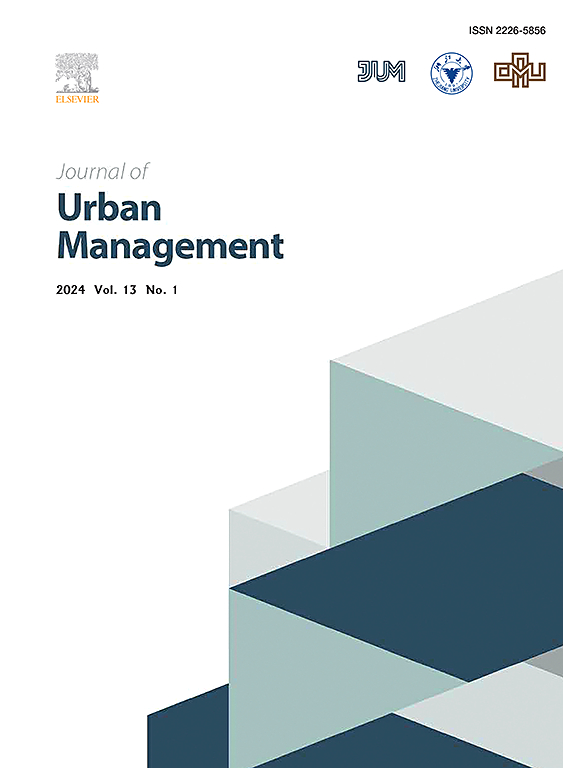知识基础的专业化和多样性如何促进地区知识的复杂性
IF 5
2区 社会学
Q1 URBAN STUDIES
引用次数: 0
摘要
为什么有些地方能产生复杂的知识,而有些地方却不能?区域知识复杂性对区域创新和经济发展具有强大的解释和预测能力,但区域知识复杂性的形成机制在很大程度上仍不透明。本研究旨在揭示区域知识基础的专业化、相关多样性和非相关多样性如何促进区域知识复杂性的形成,从而丰富重组创新以及区域复杂系统的理论。我们采用多元回归模型分析了区域知识库中的专业化、相关多样性和非相关多样性如何影响区域知识复杂性指数(KCI)。研究结果表明,专业化对地区知识复杂度指数(KCI)有积极影响,地区知识库中的相关多样性对KCI有积极影响,但仅限于地区间认知接近的条件下。专业化和区域多样性 kjm(RV) 都会产生显著的外部效应:专业化每提高一个单位,当地城市的知识资本指数就会提高 0.0002,并对周边城市产生 0.0414 的积极影响;而区域多样性每提高一个单位,东道城市的知识资本指数就会提高 0.0279,并导致周边城市的知识资本指数跃升 8.5022 个单位。相反,区域知识库中的非相关多样性对 KCI 有负面影响。一个地区知识构成的非相关多样性每增加一个单位,该城市的 KCI 就会下降 0.0147 个单位,而邻近城市的 KCI 则会下降 2.0507 个单位。研究结果表明,欠发达地区应合理分配有限资源,优先发展专业优势,同时努力缩小与发达地区的认知差距,促进知识流动。本文章由计算机程序翻译,如有差异,请以英文原文为准。
How specialization and diversity of knowledge base contribute to regional knowledge complexity
Why can complex knowledge be produced in some places but not in others? Regional knowledge complexity possesses a powerful explanatory and predictive capacity for regional innovation and economic development, yet the mechanisms underlying the formation of regional knowledge complexity remain largely opaque. This study aims to reveal the how specialization, related variety and unrelated variety of regional knowledge base contributing to the formation of regional knowledge complexity, which enriches the theories in recombination innovation as well as regional complex system. We employed multiple regression models to analyze how specialization, related variety, and unrelated variety within the regional knowledge base influence the regional Knowledge Complexity Index (KCI). The research findings indicate that specialization exerts a positive impact on the regional KCI, and the related variety within a regional knowledge base positively impacts KCI but only under the condition of cognitive proximity between regions. Both specialization and Regional Variety kjm(RV) exert significant externalities: a one-unit rise in specialization locally enhances a city's KCI by 0.0002 and affects neighboring cities positively by 0.0414, while a similar increment in RV elevates the host city's KCI by 0.0279 and induces an 8.5022-unit jump in nearby cities' KCI. Conversely, the unrelated variety in a regional knowledge base has a negative effect on KCI. A one-unit increase in the unrelated diversity of a region's knowledge composition correlates with a decline of 0.0147 units in the city's KCI and that of 2.0507 units in neighboring city's KCI. The findings suggest that less-developed regions should allocate their limited resources judiciously by prioritizing the development of specialized advantages, and concurrently, work towards narrowing the cognitive gap with their more advanced counterparts to facilitate the flow of knowledge.
求助全文
通过发布文献求助,成功后即可免费获取论文全文。
去求助
来源期刊

Journal of Urban Management
URBAN STUDIES-
CiteScore
9.50
自引率
4.90%
发文量
45
审稿时长
65 days
期刊介绍:
Journal of Urban Management (JUM) is the Official Journal of Zhejiang University and the Chinese Association of Urban Management, an international, peer-reviewed open access journal covering planning, administering, regulating, and governing urban complexity.
JUM has its two-fold aims set to integrate the studies across fields in urban planning and management, as well as to provide a more holistic perspective on problem solving.
1) Explore innovative management skills for taming thorny problems that arise with global urbanization
2) Provide a platform to deal with urban affairs whose solutions must be looked at from an interdisciplinary perspective.
 求助内容:
求助内容: 应助结果提醒方式:
应助结果提醒方式:


